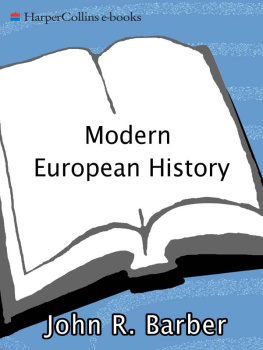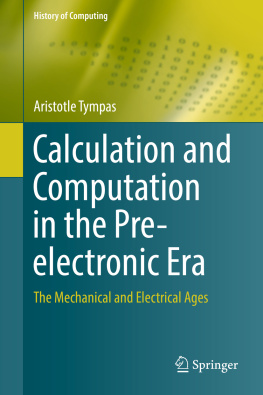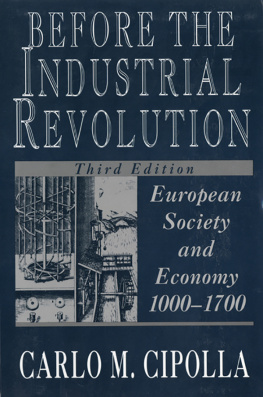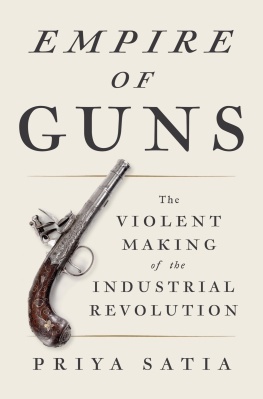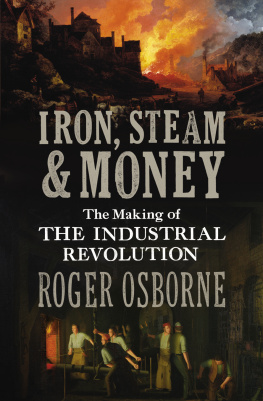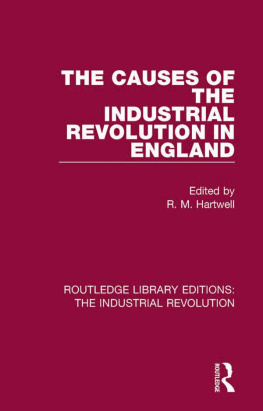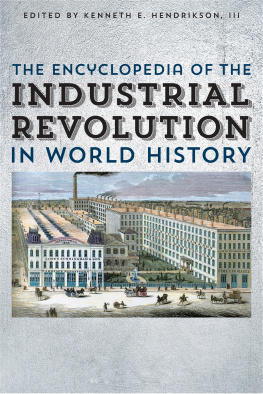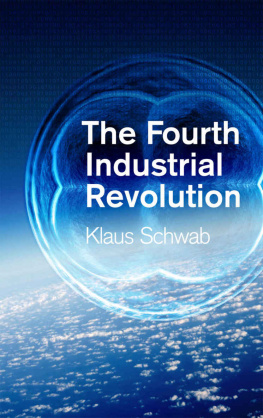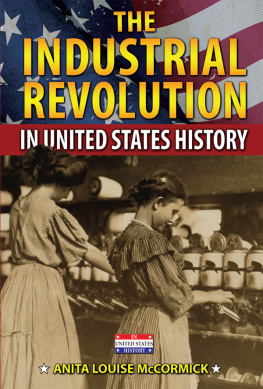The Industrial Revolution
Recent Titles in Crossroads in World History
The Enlightenment: History, Documents, and Key Questions
William E. Burns
The Rise of Christianity: History, Documents, and Key Questions
Kevin W. Kaatz
The Rise of Fascism: History, Documents, and Key Questions
Patrick G. Zander
The Industrial
Revolution
HISTORY, DOCUMENTS,
AND KEY QUESTIONS
Jeff Horn
Crossroads in World History

Copyright 2016 by ABC-CLIO, LLC
All rights reserved. No part of this publication may be reproduced, stored in a retrieval system, or transmitted, in any form or by any means, electronic, mechanical, photocopying, recording, or otherwise, except for the inclusion of brief quotations in a review, without prior permission in writing from the publisher.
Library of Congress Cataloging-in-Publication Data
Names: Horn, Jeff (Historian)
Title: The industrial revolution : history, documents, and key questions / Jeff Horn.
Description: Santa Barbara : ABC-CLIO, 2016. | Series: Crossroads in world history | Includes bibliographical references and index.
Identifiers: LCCN 2016020574 (print) | LCCN 2016022008 (ebook) | ISBN 9781610698849 (alk. paper) | ISBN 9781610698856 (ebook)
Subjects: LCSH: Industrial revolutionHistory. | IndustrializationHistory. | Social history.
Classification: LCC HD2321 .H67 2016 (print) | LCC HD2321 (ebook) | DDC 330.9/034dc23LC record available at https://lccn.loc.gov/2016020574
ISBN: 978-1-61069-884-9
EISBN: 978-1-61069-885-6
20 19 18 17 16 1 2 3 4 5
This book is also available as an eBook.
ABC-CLIO
An Imprint of ABC-CLIO, LLC
ABC-CLIO, LLC
130 Cremona Drive, P.O. Box 1911
Santa Barbara, California 93116-1911
www.abc-clio.com
This book is printed on acid-free paper 
Manufactured in the United States of America
Contents
Alphabetical List of Entries
Topical List of Entries
KEY PEOPLE
EVENTS
INSTITUTIONS
PROCESSES
RAW MATERIALS AND INVENTIONS
How to Use This Book
Throughout the course of history various events have forever changed the world. Some, like the assassination of Julius Caesar, happened centuries ago and took place quickly. Others, such as the rise of Christianity or the Enlightenment, occurred over an extended period of time and reshaped worldviews. These pivotal events, or crossroads, were departures from the established social order and pointed to new directions and opportunities. The paths leading to these crossroads in world history were often circuitous, and the routes branching off from them led to developments both anticipated and unexpected. This series helps students understand the causes and consequences of these historical turning points.
Each book in this series explores a particular crossroad in world history. Some of these events are from the ancient world and continue to reverberate today through our various political, cultural, and social institutions; others are from the modern era and have markedly changed society through their immediacy and the force of technology. While the books help students discover what happened, they also help readers understand the causes and effects linked to each event.
Each volume in the series begins with a timeline charting the essential elements of the event in capsule form. An overview essay comes next, providing a narrative history of what happened. This is followed by approximately 50 alphabetically arranged reference entries on people, places, themes, movements, and other topics central to an understanding of the historical crossroad. These entries provide essential information about their topics and close with cross-references and suggestions for further reading. A selection of 10 to 15 primary source documents follows the reference entries. Each document is accompanied by an introductory paragraph discussing the background and significance of the text. Because of their critical nature, the events covered in these volumes have generated a wide range of opinions and arguments. A section of original essays presents responses to key questions concerning the events, with each essay writer offering a different perspective on a particular topic. An annotated bibliography of print and electronic resources concludes the volume. Users can locate specific information through an alphabetical list of entries and a list of entries grouped in topical categories, as well as through a detailed index.
The various elements of each book are designed to work together to promote greater understanding of a crossroad in world history. The timeline and introductory essay overview the event, the reference entries offer easy access to essential information about key topics, the primary source documents give students first-hand accounts of the historical event, and the original argumentative essays encourage students to consider different views related to the events and to appreciate the complex nature of world history. Through its combination of background material, primary source documents, and argumentative essays, the series helps students gain insight into historical causation as they learn about the pivotal events that changed the course of history.
Preface
The Industrial Revolution changed the world. In economic terms, it gave rise to the modern era. It took centuries to develop the institutional structures, technological capacity, and global markets while accumulating enough capital to enable industrialization to occur. Centered in Great Britain in the century between 1750 and 1850, but with competition initially from France and the Austrian Netherlands (later Belgium) and then the United States and the German lands, the Industrial Revolution took advantage of European colonialism in the Atlantic world and trade ties with Asia. The Industrial Revolution also facilitated the later spurt of 19th- and 20th-century imperialism. The gap between the industrial haves and have nots widened dramatically. Unprecedented growth in manufacturing output resulting from the Industrial Revolution accelerated the elaboration of European global hegemony, forcing states that hoped to compete to seek to jumpstart their own industrial revolutions. Those that did not, or could not, found themselves relegated to providing resources and markets for increasingly dominant industrialized or industrializing powers.
This extraordinary economic transition did not come cheap. A significant proportion of the wealth, resources, and markets that underlay the Industrial Revolution were generated by the Atlantic slave trade and slavery. But the emerging working classes put in tremendously long hours laboring on dangerous machines in terrible conditions as more productive means of manufacturing goods were developed. Given this situation, it is not surprising that a huge percentage of the laborers in the first factories were there because they had no choice. Evidence for the declining standard of living for the first generations of industrial workers is overwhelming and incontrovertible. The Industrial Revolution was simply not beneficial to those who provided the raw materials or made the goods that streamed in increasing numbers from Britains, then the Wests factories, mills, and workshops. Only after 1830 did improvements in living standards trickle down to Englands workers and slowly reach the working classes in other industrialized countries.
How didhow couldsuch a system emerge? Socioeconomic elites developed progressively more powerful state structures capable of enforcing their control over recalcitrant populations that did not want to work such long hours, in dangerous and polluted places tied to machines, especially for so little money. With the population growing and opportunities for emigration to the colonies as an outlet, beginning in the 17th century, the rulers of Britain identified the interests of the state with those of entrepreneurs ever more tightly. The British state implemented a legal framework conducive to protecting property owners, supported financial institutions like the Bank of England to provide cheap and plentiful credit, and fought wars both to defend and to acquire economic assets. Acts of Parliament to aid certain industries and particular entrepreneurs with money or monopolistic control were supplemented by the deployment of troops, police spies, and the entire military apparatus of the British state to prevent the working classes from effectively resisting their domination with force. Despite the prevalence of the myth that laissez-faire underlay its economic policies, government action was essential to British leadership of the Industrial Revolution. States that sought to follow in Britains footsteps had to be even more active in fostering and protecting industrial society.
Next page




